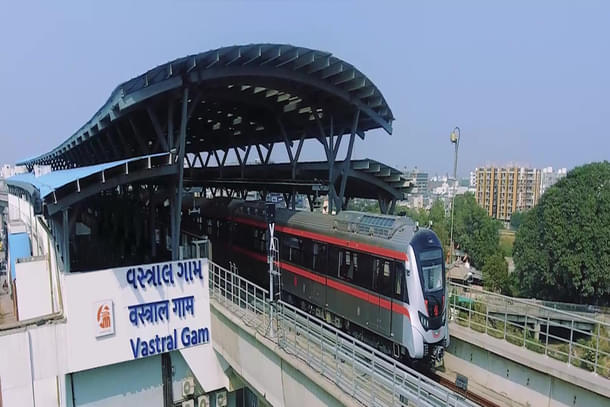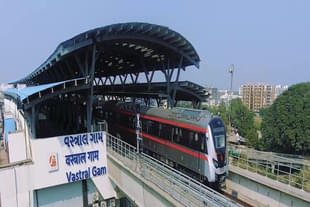Infrastructure
Single Bidder, Titagarh Rail Systems Signs Rs 857 Crore Rolling Stock Contract For First Phase Of Surat Metro
Amit Mishra
Oct 04, 2023, 12:07 PM | Updated 12:07 PM IST
Save & read from anywhere!
Bookmark stories for easy access on any device or the Swarajya app.


Titagarh Rail Systems Limited (TRSL), formerly known as Titagarh Wagons Limited has signed a contract worth Rs 857 crore for supply of rolling stock for the Surat Metro Rail Phase I project.
This was announced by the engineering company on Tuesday (3 October) in a regulatory filing.
Under the terms of the agreement, TRSL will undertake design, manufacture, supply, testing, commissioning and training of 72 standard gauge cars for the first phase of Surat Metro. There will be 24 trains of three cars each.
The company said the delivery of the first car is slated to commence 76 weeks (nearly 18 months) after the signing the contract and the entire contract is expected to be completed in 132 weeks (close to three years) thereafter.
The Metro coaches will be manufactured at TRSL’s facility in Utarpara, located in the Hooghly district of West Bengal.
The company has already received a Letter of Acceptance (LoA) for 30 standard gauge cars for Phase-II of the Ahmedabad Metro Rail Project, according to the company's release.
Single Bidder
Interestingly, the Kolkata-based company was the lone bidder for the tender floated by the Gujarat Metro Rail Corporation (GMRC) in November 2021 to supply a total of 72 Metro cars for Surat Metro Phase 1.
Despite four extensions, Titagarh remained the only bidder in the fray and the GMRC ultimately awarded the contract to the private firm.
Rule 166 of the General Financial Rules (GFR) 2017, mandates that procurement from a single source can be resorted only under three circumstances — when the user department knows that “only a particular firm is the manufacturer of the required goods”; in a case of emergency “when the required goods are to be purchased from a particular source and the reason for such decision is to be recorded and approval of the competent authority obtained” and “for standardisation of machinery or spare parts to be compatible to the existing sets of equipment (on advice of a competent technical expert and approved by the competent authority)”.
The GMRC on its behalf defended the selection of the lone bidder, having said, “If the lone bidder has the required competence, then we can award the tender”.
Quoting GMRC officials, an Indian express report said that other tenders for Surat Metro, including those for viaduct, stations and traction, were at an advanced stage.
As such if the rolling stock tender had to be discontinued or withdrawn, it will not allow sufficient time to receive the rolling stock in Surat for integration with the signalling and traction system and the trials in time before the proposed commencement of operations by December 2024.
Surat Metro
The Surat Metro Rail Project encompasses two corridors spanning a total of 40.45 kilometres with 38 stations and an estimated cost of Rs 12,020 crore.
The 21.61-km-long first corridor spans from Sarthana to Dream city, referred to as the diamond route and will have six underground and 14 elevated stations. This includes a 6.47-km underground stretch from Kapodra to Dream city.
The 18.84 km second corridor, known as the textile corridor will run between Bhesan and Saroli. It will be an elevated corridor with 18 stations.
While the first corridor is expected to be operational before December 2024, the second corridor is slated for completion by March 2025.





